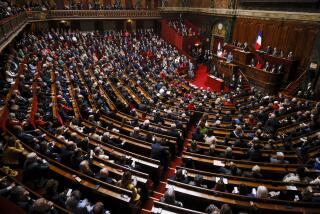France May Limit Artificial Pregnancies : Medicine: Controls sought by government would be among world’s strictest. ‘We want to stay very close to nature,’ one official says.
- Share via
PARIS — France’s conservative government said Wednesday that it will seek to impose strict controls on artificial impregnation, including a requirement that infertile couples have the consent of the sperm donor and a judge’s permission before receiving an embryo implant.
The government was spurred by a growing national debate this week following the birth of twins to a 59-year-old, post-menopausal British woman, who received an embryo implant at an Italian clinic. The doctors who did that implant say a 62-year-old Italian woman, Rosana Della Corte, now is three months pregnant after a similar treatment.
A bill that easily passed France’s National Assembly a year ago, and awaits approval by the Senate, calls for a ban on embryo implants for women after menopause. But the new package of bills, if approved, will subject couples seeking artificial impregnation in France to some of the world’s toughest restrictions.
“We are in a situation where the state has to take its responsibilities,” said Prime Minister Edouard Balladur.
The prime minister’s spokesman, Nicolas Sarkozy, said Balladur knew the issue would be controversial and “that all efforts to legislate in such complex, touchy and changing areas must be made in a spirit of great intellectual modesty.”
The government’s plans were revealed by Social Affairs Minister Simone Veil after the Cabinet’s regular weekly meeting. She told her fellow ministers that medical advances in assisted procreation and transplants have made stricter rules necessary.
“We want to stay very close to nature,” Veil said. “But one must introduce some kind of framework, without stopping all women from benefiting from medical progress and having children when they wish if they are sterile.”
Veil said the government plans to fine-tune the medical ethics bill that the National Assembly passed earlier before submitting it to the Senate.
The new laws would impose new barriers to artificial insemination and embryo implantation, especially in cases where there are no biological links between the embryo and the couple who receive it. Under the government’s proposals, a judge would be asked to consider a variety of factors in each case, including the biological connection of the embryo to the prospective parents and whether the sperm donor consented to the procedure.
The package of legislation already approved by lawmakers would allow “medically assisted procreation” only to remedy sterility or to avoid the transmission of disease to the child. It could not be used for women without partners, homosexuals or women past menopause.
Although analysts foresee a lively debate in Parliament, they say the government majority is likely to prevail unless it is persuaded to withdraw the legislation. And even a restrictive law in France, doctors say, would not prevent French couples from seeking treatment in other European countries.
Leading French doctors are divided on the proposed law.
Jacques Testart, head of one of France’s leading in vitro research laboratories, said the ability “to totally change our way of living is a daring gesture that belongs, not to medicine, but to politics in its noble sense.”
But Claude Sureau, a member of the French National Academy of Medicine and president of the ethics committee of the International Federation of Gynecology and Obstetrics, said, “I don’t think a law forbidding such things is good.
“How does one define the normal age of menopause?” he asked. “And if one allows the law to interfere in such a private domain, one is in a dangerous ethical situation of genetic totalitarianism.”
More to Read
Sign up for Essential California
The most important California stories and recommendations in your inbox every morning.
You may occasionally receive promotional content from the Los Angeles Times.














